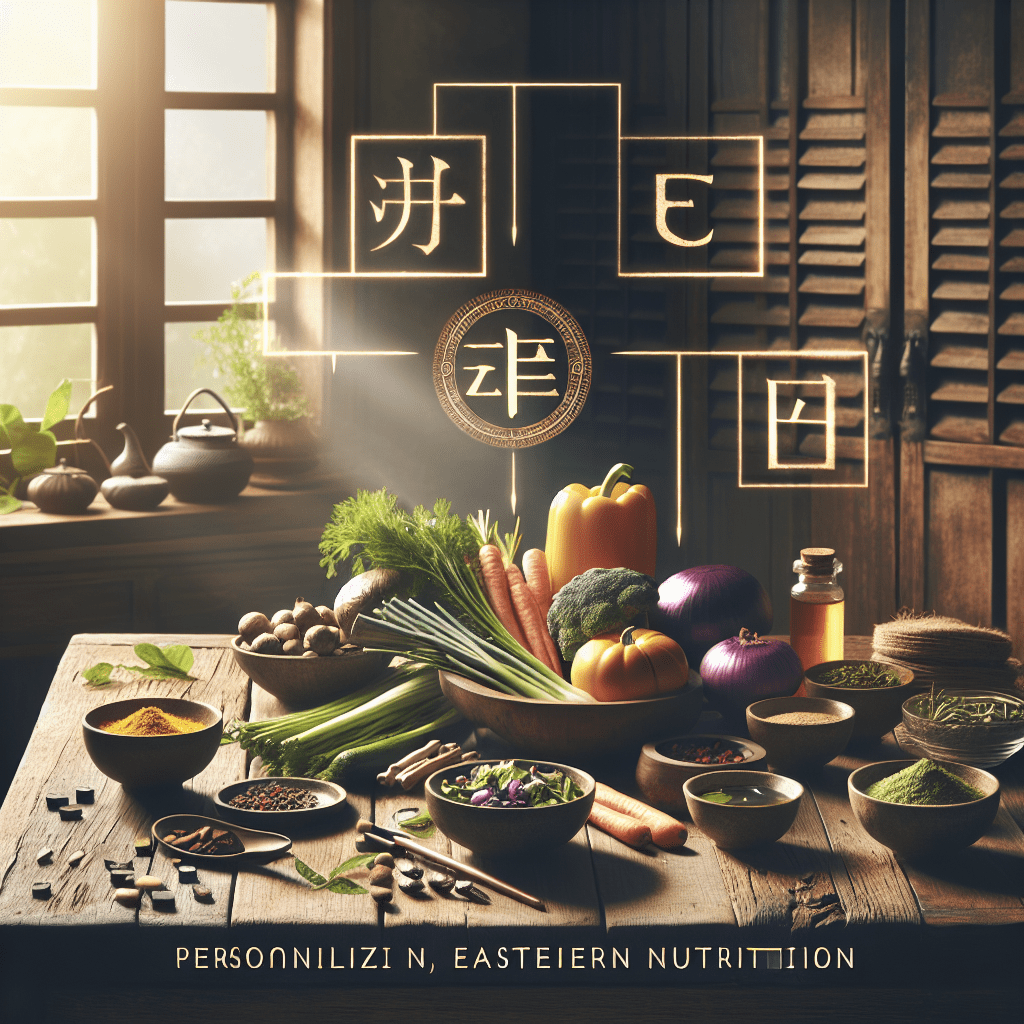“Let food be thy medicine” – Hippocrates knew it, and Eastern medicine has practiced it for millennia. Discover how your perfect meal plan might be hidden in the wisdom of your own body.
Have you ever wondered why that one-size-fits-all diet your friend swears by just doesn’t work for you? In Eastern medicine, this mystery has a simple explanation: your body is uniquely yours, with its own specific needs and imbalances. This is where Custom Dietary Therapy comes in—a personalized approach to nutrition deeply rooted in Traditional Chinese Medicine (TCM) that has been nurturing health for thousands of years.
Unlike modern nutrition that often focuses solely on calories and macronutrients, Custom Dietary Therapy views food as medicine, capable of restoring balance and harmony to your entire being. This ancient wisdom doesn’t separate your physical body from your emotions or spirit—instead, it recognizes that true health emerges when all aspects of yourself are in balance.
At its core, TCM sees health as a delicate dance between opposing yet complementary forces. When these forces fall out of sync, Custom Dietary Therapy offers a way to restore harmony through thoughtfully selected foods that address your specific imbalances. It’s like having a nutritional roadmap designed exclusively for your body’s unique terrain.
Reading Your Body: The TCM Assessment Process
Eastern medicine views your body as a unique landscape with its own climate, terrain, and natural patterns. Understanding this landscape is the first step in creating your perfect dietary therapy plan.
Before any dietary recommendations can be made, a TCM practitioner must first understand your unique constitution and current state of health. This assessment process, known as syndrome differentiation, is both an art and a science that has been refined over centuries.
Unlike a standard medical check-up that might focus primarily on lab results, a TCM assessment engages all the practitioner’s senses. They’ll carefully observe your complexion, the sound of your voice, and your overall demeanor. They’ll ask detailed questions about your sleep patterns, digestion, energy levels, and emotional well-being.
“In TCM, we don’t just want to know what you’re experiencing—we want to understand the pattern behind your symptoms,” explains Dr. Lin, a TCM practitioner with over 20 years of experience. “This comprehensive approach allows us to see connections that might otherwise be missed.”
Two particularly important diagnostic methods include pulse and tongue assessment. Your pulse isn’t just about how fast your heart beats—a trained practitioner can feel subtle qualities at different positions along your wrist, each corresponding to different organ systems. Is your pulse deep or superficial? Strong or weak? These variations tell a story about your internal health.
Similarly, your tongue offers a wealth of information. Its color, coating, shape, and moisture level provide clues about digestive function, blood circulation, and energy flow. A pale tongue might suggest blood deficiency, while a red tongue could indicate heat patterns in the body.
Through this comprehensive assessment, patterns emerge—perhaps revealing that you have a “Spleen Qi deficiency” or “Liver Qi stagnation.” These patterns, far from being mere labels, are detailed maps that guide the practitioner in crafting your Custom Dietary Therapy plan.
The Principles Behind Your Plate: Understanding Food Properties
Every food has a personality and purpose in Eastern nutrition theory. Learning these properties helps you make choices that specifically support your body’s needs.
Once your body’s patterns have been identified, the next step in Custom Dietary Therapy is selecting foods with properties that will restore balance. In TCM, foods are not just bundles of nutrients—they possess energetic qualities that interact with your body in specific ways.
Every food is categorized according to several key properties:
Temperature nature: Foods can be warming, cooling, neutral, or hot. If you’re experiencing a “cold” condition like poor circulation with cold hands and feet, warming foods like ginger, cinnamon, and lamb might be recommended. Conversely, if you’re dealing with “heat” symptoms like inflammation or irritability, cooling foods such as cucumber, watermelon, and pear could help restore balance.
Flavor: The five flavors—sweet, sour, bitter, pungent, and salty—aren’t just about taste preferences. Each flavor has specific actions in the body. Sour foods like lemon can help generate fluids and are astringent, while bitter foods such as dandelion greens can clear heat and dry dampness.
Direction of energy: Some foods have an upward energy that lifts and energizes, while others have a downward energy that grounds and calms. Understanding these directional tendencies helps practitioners select foods that counterbalance excessive movements of energy in your body.
Perhaps most fascinating is how these food properties relate to the Five Elements Theory—Wood, Fire, Earth, Metal, and Water. Each element corresponds to specific organs, emotions, and flavors. For instance, the Earth element relates to the Spleen and Stomach, is associated with worry and pensiveness, and is nourished by sweet flavors (though not the processed sugars of modern diets—think sweet potatoes and rice).
“When we understand the Five Elements, we can see how supporting one organ system naturally influences others in predictable ways,” shares nutritional therapist Sarah Wong. “For example, nourishing the Kidney (Water element) can help support the Liver (Wood element) because Water nourishes Wood in the creative cycle.”
This interconnected view means your Custom Dietary Therapy plan isn’t just addressing individual symptoms—it’s working to restore harmony throughout your entire system.
Crafting Your Custom Plan: The Art of Personalization
Your dietary plan should be as unique as your fingerprint—reflecting not just your physical needs, but your emotional tendencies, lifestyle, and even the changing seasons.
With a clear understanding of your body’s patterns and the properties of various foods, a TCM practitioner can now design a Custom Dietary Therapy plan tailored specifically to you. This isn’t about following rigid rules—it’s about creating a flexible framework that honors your unique needs.
Your constitutional type forms the foundation of this plan. Perhaps you naturally run hot with a robust constitution, or maybe you tend toward sensitivity with a more delicate system. These inherent tendencies inform which foods will best support your long-term well-being.
Current health concerns then layer onto this foundation. Are you recovering from illness? Preparing for a stressful work period? Experiencing seasonal allergies? Your dietary plan will shift to address these immediate needs while still respecting your underlying constitution.
What makes Custom Dietary Therapy truly unique is its responsiveness to multiple factors:
Seasonal adjustments: Nature moves through cycles, and your diet should follow suit. In winter, more warming, substantial foods support the body’s need for conservation, while summer calls for lighter, cooling fare to balance the external heat.
Life stage considerations: A growing child, a pregnant woman, and an elder all have different nutritional needs. Custom Dietary Therapy recognizes these variations and adjusts recommendations accordingly.
Geographic location: Traditional wisdom acknowledges that those living in humid coastal regions have different dietary needs than those in dry mountain areas. Your environment influences which foods will best support your health.
Personal preferences and lifestyle: The most perfectly balanced diet is useless if you can’t maintain it. A good practitioner works with your tastes, cooking abilities, schedule, and cultural background to create a plan you can actually follow.
“The beauty of Custom Dietary Therapy is that it evolves with you,” notes nutritional consultant Michael Chen. “As your body changes and responds to the dietary shifts, your plan adjusts accordingly. It’s a dynamic, ongoing conversation between you and your food.”
Bringing Theory to Your Table: Practical Implementation
Theory becomes healing when you bring these ancient principles into your kitchen. Small, consistent changes often yield the most profound results.
Understanding the theory behind Custom Dietary Therapy is fascinating, but the real magic happens when you begin implementing these principles in your daily life. Here are some practical approaches to making this ancient wisdom work in your modern kitchen:
Start with small changes: Rather than overhauling your entire diet overnight, begin by incorporating one or two suggested foods or cooking methods. Perhaps add warming spices to your morning porridge or experiment with congee (rice porridge) as a digestive-friendly breakfast option.
Cook with awareness: The way you prepare food matters just as much as the ingredients themselves. Slow, gentle cooking methods like simmering and steaming preserve the qi (vital energy) of foods, while excessive frying or grilling can create heat in the body.
Embrace food pairing wisdom: Certain food combinations enhance digestibility and nutritional absorption. For instance, pairing aduki beans with winter squash helps the body process the beans more easily, reducing digestive discomfort.
Honor meal timing: In TCM, when you eat is nearly as important as what you eat. Your digestive fire (Spleen qi) is strongest between 7-11 am, making breakfast and lunch your most important meals for substantial nourishment.
Track your responses: Keep a simple journal noting how different foods affect your energy, mood, digestion, and sleep. These observations provide valuable feedback for refining your dietary plan.
Regular follow-up consultations with your practitioner are essential for adjusting your Custom Dietary Therapy plan as needed. As your body responds to dietary changes, new patterns may emerge that require different supportive foods.
“The body speaks to us constantly through sensations, energy levels, and even cravings,” explains wellness coach Lisa Tan. “Learning to listen to these messages is part of the healing journey.”
Merging Ancient Wisdom with Modern Life: The HerbalsZen Approach
HerbalsZen’s EASTCHI AI brings the wisdom of Eastern dietary therapy into the digital age, making personalized nutrition accessible to everyone seeking balance through food.
The principles of Custom Dietary Therapy align beautifully with HerbalsZen’s philosophy of bringing Eastern healing wisdom into our contemporary world. Through EASTCHI AI, HerbalsZen has created an innovative bridge between traditional knowledge and modern technology, making personalized nutrition more accessible than ever.
EASTCHI AI analyzes your constitutional type through the lens of Five Element Theory, offering insights into your unique tendencies and imbalances. By understanding your element affiliations, you gain deeper awareness of which foods naturally support your well-being.
The platform’s seasonal dietary guidance reflects TCM’s emphasis on living in harmony with nature’s cycles. As seasons shift, so do the recommendations—helping you maintain balance throughout the year without having to become an expert in Eastern medicine yourself.
Perhaps most importantly, EASTCHI AI embodies the Eastern concept of food as medicine. Rather than seeing nutrition as merely fuel or focusing exclusively on weight management, this approach honors food’s profound ability to heal, strengthen, and balance your entire being.
Custom Dietary Therapy isn’t about following a rigid set of rules or eliminating entire food groups. It’s about developing a relationship with food that’s based on awareness, respect for your unique body, and the wisdom of thousands of years of observation and refinement.
As you explore this personalized approach to nutrition, you may discover that the perfect meal plan isn’t found in the latest diet book or trending hashtag—it’s written in the subtle language of your own body, waiting to be understood through the compassionate lens of Eastern medicine.
By embracing Custom Dietary Therapy, whether through traditional consultation or innovative platforms like EASTCHI AI, you’re not just changing what’s on your plate—you’re transforming your relationship with food, your body, and the natural rhythms that connect us all.




